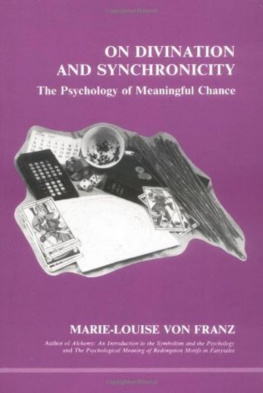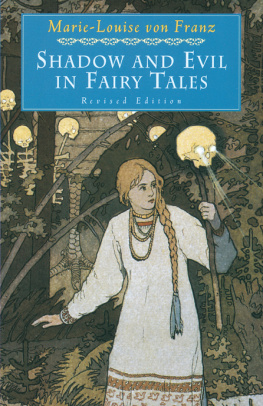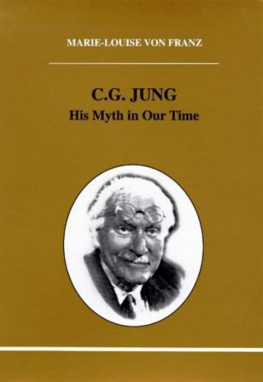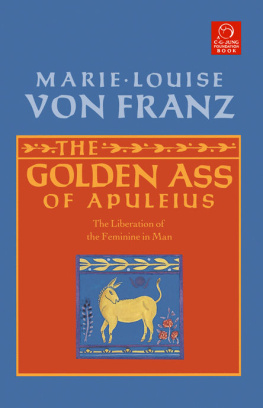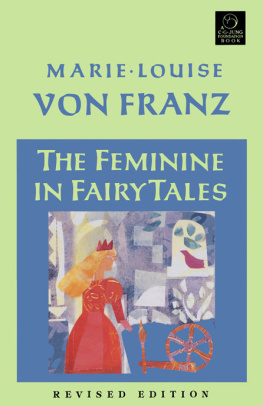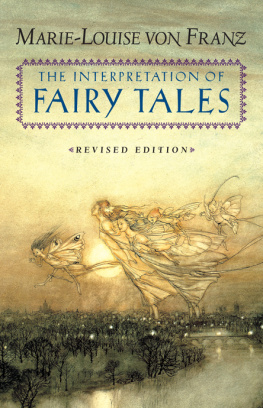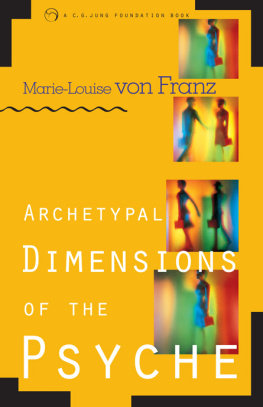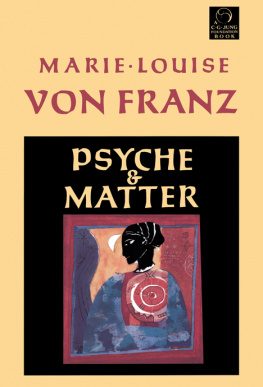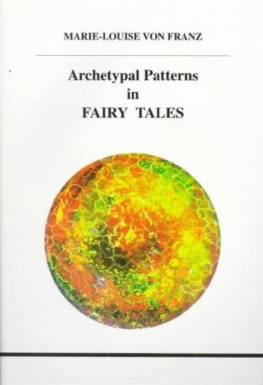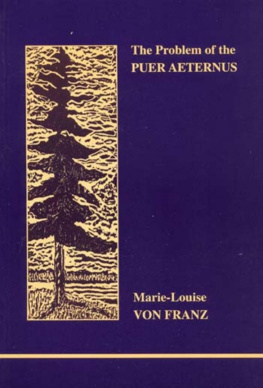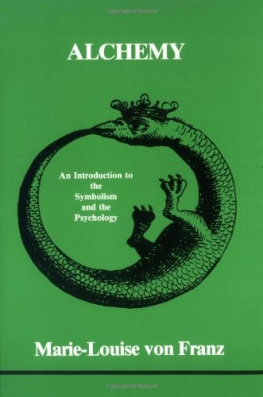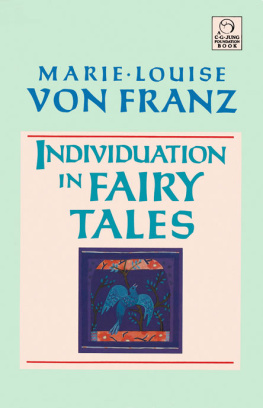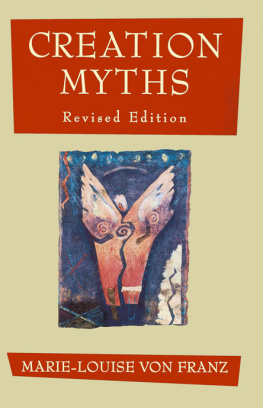Marie-Louise von Franz - On Divination & Synchronicity: The Psychology of Meaningful Chance
Here you can read online Marie-Louise von Franz - On Divination & Synchronicity: The Psychology of Meaningful Chance full text of the book (entire story) in english for free. Download pdf and epub, get meaning, cover and reviews about this ebook. year: 1982, publisher: Inner City Books, genre: Science. Description of the work, (preface) as well as reviews are available. Best literature library LitArk.com created for fans of good reading and offers a wide selection of genres:
Romance novel
Science fiction
Adventure
Detective
Science
History
Home and family
Prose
Art
Politics
Computer
Non-fiction
Religion
Business
Children
Humor
Choose a favorite category and find really read worthwhile books. Enjoy immersion in the world of imagination, feel the emotions of the characters or learn something new for yourself, make an fascinating discovery.
- Book:On Divination & Synchronicity: The Psychology of Meaningful Chance
- Author:
- Publisher:Inner City Books
- Genre:
- Year:1982
- Rating:5 / 5
- Favourites:Add to favourites
- Your mark:
- 100
- 1
- 2
- 3
- 4
- 5
On Divination & Synchronicity: The Psychology of Meaningful Chance: summary, description and annotation
We offer to read an annotation, description, summary or preface (depends on what the author of the book "On Divination & Synchronicity: The Psychology of Meaningful Chance" wrote himself). If you haven't found the necessary information about the book — write in the comments, we will try to find it.
Marie-Louise von Franz: author's other books
Who wrote On Divination & Synchronicity: The Psychology of Meaningful Chance? Find out the surname, the name of the author of the book and a list of all author's works by series.
On Divination & Synchronicity: The Psychology of Meaningful Chance — read online for free the complete book (whole text) full work
Below is the text of the book, divided by pages. System saving the place of the last page read, allows you to conveniently read the book "On Divination & Synchronicity: The Psychology of Meaningful Chance" online for free, without having to search again every time where you left off. Put a bookmark, and you can go to the page where you finished reading at any time.
Font size:
Interval:
Bookmark:
Marie-Louise von Franz, Honorary Patron
STUDIES IN JUNGIAN PSYCHOLOGY BY JUNGIAN ANALYSTS
Daryl Sharp, General Editor
Canadian Cataloguing in Publication Data
Franz, Marie-Louise von, 1915
On divination and synchronicity
(Studies in Jungian psychology; 3)
Based on a series of lectures delivered in 1969 at the C.G. Jung Institute in Zurich, Switzerland. Includes index. ISBN 0-919123-02-3
1. Coincidence in psychical research Psychological aspects. 2. Divination. 3. Psychical research. 4. Jung, Carl Gustav, 1875- 1961.
I. Title. II. Series.
BF1175.F72 133 C80-094576-X
Copyright 1980 by Marie-Louise von Franz.
All rights reserved.
INNER CITY BOOKS
Box 1271, Station Q, Toronto, Canada M4T 2P4
Honorary Patron: Marie-Louise von Franz
Publisher and General Editor: Daryl Sharp
Editorial Board: Fraser Boa, Daryl Sharp, Marion Woodman
Marie-Louise von Franz is a Jungian Analyst practising in Ksnacht, Switzerland.
Cover Photo by Dave Sharp. Illustrations by Ann Yeoman.
Set in Baskerville by Blain Berdan, Toronto.
Printed and bound in Canada byUniversity of Toronto Press Incorporated
You may perhaps know of the amusing fact that originally divination was always practised in churches. The old Jews, for instance, had a divination oracle in their sanctuaries in Jerusalem and on certain occasions when the priest wanted to consult Jahweh he tried through such oracles to discover the will of God. In all primitive civilizations divination techniques have been used to find out what God, or the gods, want, but in time this has been discontinued and outgrown; it has become a dark, magical, and despised practice, but today this lecture is being given in the Kirchgemeinde (parish church), a nice little synchronicity.
The view of the world which Jung tried to bring back into focus, and on which divination basically rests, is that of synchronicity therefore before we go into details about the problems of divination we have to remember what Jung said about synchronicity. In his Foreword to the English edition of Richard Wilhelm's translation of The I Ching or Book of Changes, he gives a very good summary of the difference between causal and synchronistic thinking. Causal thinking is, so to speak, lineal. There is a sequence of events A, B, C, D, and you think backwards and wonder why D appears because of C, why C appears because of B, and why B because of A, like some kind of inner or outer event. One tries to trace back in one's mind why these coordinate effects have worked.
We know that through the investigations of modern physicists it has now been proved that on the microphysical level this principle is no longer completely valid; we can no longer think of causality as absolute law, but only as a tendency or prevailing probability. So causality is shown to be a way of thinking which satisfies our mental grasp of a cluster of physical events, but does not completely get at the core of natural laws, it only delineates general trends or possibilities. Synchronistic thinking, on the other hand, one could call field thinking, the centre of which is time.
Time also comes into causality since we normally think that the cause comes before the effect. In modern physics it sometimes looks as if the effect came before the cause, and therefore they try to turn it round and say that you could still callthat causal; but I think Jung is right in saying that that is enlarging and twisting the idea of causality ad absurdum so far that it loses its meaning. Normally, cause always comes before effect, so there also is a lineal idea of time, before and after, with the effect always after the before.
Synchronistic thinking, the classic way of thinking in China, is thinking in fields, so to speak. In Chinese philosophy such thinking has been developed and differentiated much more than in any other civilization; there the question is not why has this come about, or what factor caused this effect, but what likes to happen together in a meaningful way in the same moment? The Chinese always ask: "What tends to happen together in time?" So the centre of their field concept would be a time moment on which are clustered the events A, B, C, D, and so on (Figure 1).
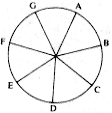
Figure 1.
Field of time (time-bound ensemble of events).
Richard Wilhelm puts it very well in his Introduction to the I Ching where he speaks of the complex of events which occur at a certain time moment.
In our causal thinking we have made a big separation between psychic events and physical events, and we only watch to see how physical events produce, or have a causal effect upon, each other and on psychological events. Right up to the 19th century the idea still persisted in the sciences (and it still does in those less developed) that only physical causes have physical effects and psychic causes psychological effects; for instance, Freud's way of thinking: "This woman is neurotic and has an idiosyncrasy as the result of a childhood trauma." That would be the same kind of thinking but transposed onto the psychological level.
The question now being asked is whether there are interactions between those two lines. Is there something like a psychic cause for physical events and vice versa? That is a problem of psychosomatic medicine. Interactions between those two chains of causality can be proved: you may read a letter saying that somebody you loved very much has died, and get physiological effects; you may even faint, a reaction caused not by the ink and the paper, but by the psychic content of the communication. There is a causal interaction between those two lines which one is only now beginning to investigate.
The synchronistic, i.e., the Chinese way of thinking, however, is completely different. It is a differentiation of primitive thinking in which no difference has ever been made between psychological and physical facts. In their question as to what likes to occur together, one can bring in both inner and outer facts. For the synchronistic way of thinking it is even essential to watch both areas of reality, the physical and the psychic, and to notice that at the moment when one had these and these thoughts or these and these dreams which would be psychological events such and such outer physical events happened; i.e., there was a complex of physical and psychological events. Though causal thinking also poses the problem of time in some form because of the before and after, the problem of time is much more central in the synchronistic way of thinking because there it is the key moment a certain moment in time which is the uniting fact, the focal point for the observation of this complex of events.
In modern Western science, algebraic means are used to describe the probabilities of the sequence of events algebraic matrices of different forms and algebraic functions and curves. The Chinese also use mathematics for the description of their laws of synchronicity. They use something like mathematical matrices but not algebraic abstractions; they use the individual natural integers (1, 2, 3, 4, 5, 6, 7), so one could say that the mathematics of this Chinese way of thinking would be the different qualifications one can draw from the series of natural integers, the common laws which one can abstract from them. One uses the 3, 4, and 5 to grasp a cluster of events in a mathematical form.
The basis of the science of mathematics, or the scientific mathematics of synchronistic thinking, is therefore the series of natural integers, and one finds that in all techniques of divination. The simplest form of divination is the binary: hit or miss. One throws a coin and gets heads or tails and accordingly decides whether one will go or not to the Rigi, or whichever direction you are undetermined about. Hit or miss is the basic idea of all divination but in different civilizations there are differentiated techniques by which to read the situation better at a certain time moment.
Next pageFont size:
Interval:
Bookmark:
Similar books «On Divination & Synchronicity: The Psychology of Meaningful Chance»
Look at similar books to On Divination & Synchronicity: The Psychology of Meaningful Chance. We have selected literature similar in name and meaning in the hope of providing readers with more options to find new, interesting, not yet read works.
Discussion, reviews of the book On Divination & Synchronicity: The Psychology of Meaningful Chance and just readers' own opinions. Leave your comments, write what you think about the work, its meaning or the main characters. Specify what exactly you liked and what you didn't like, and why you think so.

